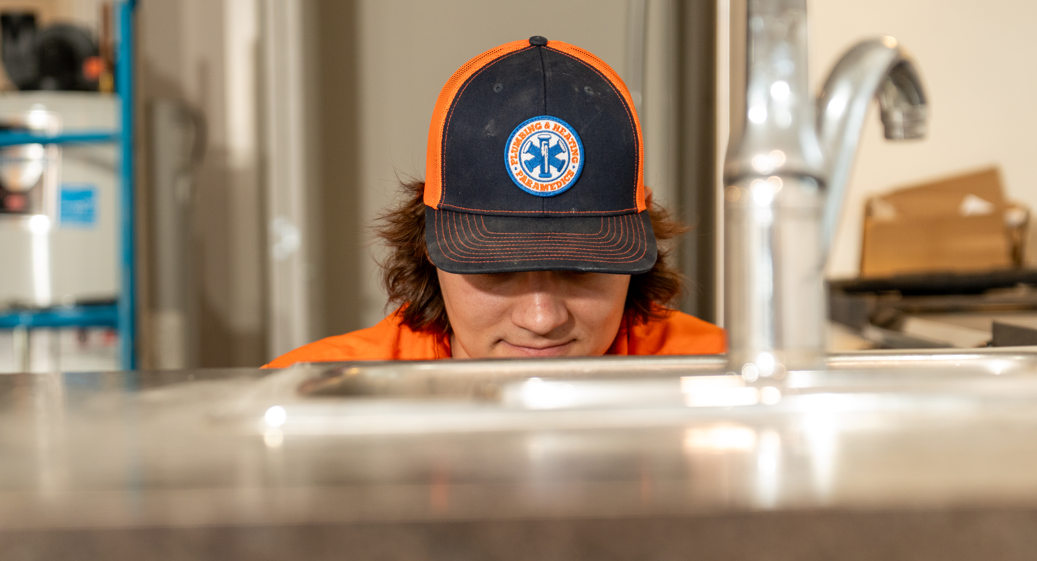Should You Choose Reverse Osmosis?

At the Plumbing Paramedics, it’s our goal to always help Calgarians find the right solution for them. From the type of toilet you use to the showerhead that is best suited to your needs, everyone is different, so our Calgary plumbers don’t recommend a one-size-fits-all approach. This brings us to a question we’ve been hearing a lot lately: should Calgarians be thinking about installing a reverse osmosis water system?
The Good
Reverse Osmosis water systems effectively produce safe drinking water. In fact, in many areas around the world, like Australia, where there is abundant saltwater and not enough fresh water, reverse osmosis systems are used by municipalities to provide clean drinking water to residents. This is because reverse osmosis systems force water through a series of carbon filters and semi-permeable membranes. As the water is pushed through, all impurities — including salt — are stripped away, leaving pure water. This makes a reverse osmosis system particularly good in areas with high levels of water contamination.
After Flint, Michigan, even Canadians are a bit more cautious about trusting that municipal tap water is unquestionably safe. Furthermore, many Albertans drink well water in areas where the water table may be affected by high pesticide and herbicide use. In these areas, reverse osmosis water systems can give you peace of mind. When everything but water is torn away, you know exactly what you’re drinking: pure, clean water.
The Bad
Of course, the problem with stripping everything but the water away is that you’re throwing out the good with the bad. Important minerals, like iron and magnesium, are often present in drinking water. But a reverse osmosis system will remove these minerals. Compounding this problem, when you cook vegetables or meat in reverse osmosis water, your food loses the vast majority of its natural vitamins and minerals.
Vegetables are particularly vulnerable. They can lose up to 60 percent of their magnesium and calcium, 66 percent of their copper, 70 percent of their manganese, and 86 percent of their cobalt when cooked in reverse osmosis treated water. In contrast, vegetables boiled in hard water (such as Calgary’s tap water) lose almost no minerals. What this means is not only will you not be able to absorb vitamins from the water you drink, but you’ll also get far fewer vitamins from the vegetables you eat if they’re cooked in reverse osmosis treated water.
When it comes to reverse osmosis, whether or not it’s right for you is going to depend on your situation. If you already struggle with an iron deficiency and your water isn’t contaminated by lead or pesticides, you’ll probably benefit more from drinking municipal tap water. If you don’t have to worry about any deficiencies and you dislike the taste of Calgary tap water, installing a reverse osmosis system may be a good choice. However, you shouldn’t cook using reverse osmosis treated water.
Weighed the pros and the cons and decided you want a reverse osmosis system? Our friendly Calgary plumbers can you help you with that! Give us a call today, and we’ll schedule your reverse osmosis installation!
Call us or Book Now an appointment.
Recent Posts
Customer Testimonials
Excellent service. David was right on time. Investigated quickly and explained all the options. Worked very effectively and explained future choices for our upcoming renovation plans. Highly recommend for any plumbing work.
Excellent service. David was right on time. Investigated quickly and explained all the options. Worked very effectively and explained future choices for our upcoming renovation plans. Highly recommend for any plumbing work.
Excellent service. David was right on time. Investigated quickly and explained all the options. Worked very effectively and explained future choices for our upcoming renovation plans. Highly recommend for any plumbing work.
Excellent service. David was right on time. Investigated quickly and explained all the options. Worked very effectively and explained future choices for our upcoming renovation plans. Highly recommend for any plumbing work.
Excellent service. David was right on time. Investigated quickly and explained all the options. Worked very effectively and explained future choices for our upcoming renovation plans. Highly recommend for any plumbing work.
Excellent service. David was right on time. Investigated quickly and explained all the options. Worked very effectively and explained future choices for our upcoming renovation plans. Highly recommend for any plumbing work.
Excellent service. David was right on time. Investigated quickly and explained all the options. Worked very effectively and explained future choices for our upcoming renovation plans. Highly recommend for any plumbing work.
Excellent service. David was right on time. Investigated quickly and explained all the options. Worked very effectively and explained future choices for our upcoming renovation plans. Highly recommend for any plumbing work.
Excellent service. David was right on time. Investigated quickly and explained all the options. Worked very effectively and explained future choices for our upcoming renovation plans. Highly recommend for any plumbing work.
Excellent service. David was right on time. Investigated quickly and explained all the options. Worked very effectively and explained future choices for our upcoming renovation plans. Highly recommend for any plumbing work.
Excellent service. David was right on time. Investigated quickly and explained all the options. Worked very effectively and explained future choices for our upcoming renovation plans. Highly recommend for any plumbing work.
Excellent service. David was right on time. Investigated quickly and explained all the options. Worked very effectively and explained future choices for our upcoming renovation plans. Highly recommend for any plumbing work.




















